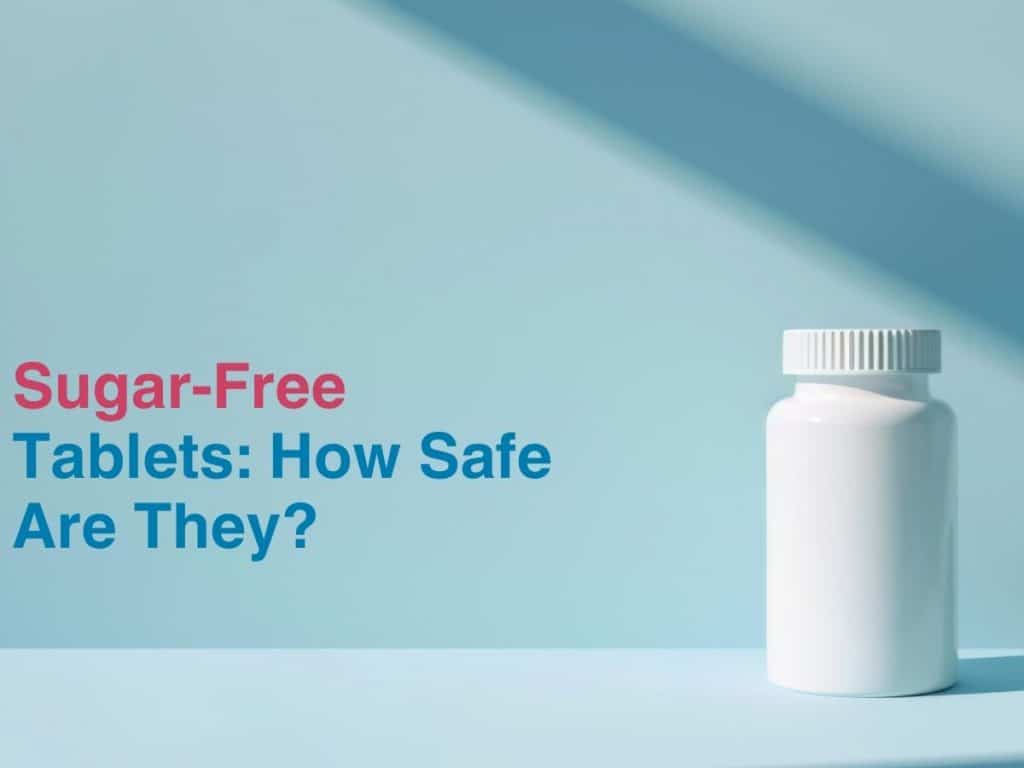
Sugar-Free Tablets: How Safe Are They?

For people with diabetes or those looking to reduce their sugar intake, sugar-free tablets can seem like an attractive option. But how safe are these products really? Let’s dive into sugar-free sweeteners and explore their benefits,
potential risks, and what you need to know to make informed choices. The growing need for sugar alternatives is clear. According to the International Diabetes Federation, 463 million people worldwide had diabetes in 2019, with
projections reaching 629 million by 2045. This staggering increase underscores the importance of finding safe and effective sugar substitutes.
Are sugar-free tablets safe for diabetics?
Sugar-free tablets are generally considered safe for people with diabetes when used in moderation. These products can help manage blood sugar levels by providing sweetness without the glucose spike associated with regular sugar. A
teaspoon of table sugar contains about 49 calories, while many sugar-free alternatives like aspartame and sucralose have near-zero calories, making them attractive options for those monitoring their calorie intake.
Potential side effects of sugar-free tablets
While sugar-free tablets are generally safe, some people may experience side effects, particularly when consumed in large quantities. These can include:
- Digestive issues: Some sugar alcohols used in sugar-free products can cause bloating, gas, or diarrhea in sensitive individuals. For instance, sorbitol and mannitol can have a laxative effect in high doses.
- Headaches: Some people report headaches after consuming artificial sweeteners.
- Tooth decay: Although sugar-free, some tablets may still contribute to dental erosion.
Health benefits of sugar-free sweeteners for diabetes
Sugar-free sweeteners can offer several benefits for people with diabetes:
- Better blood sugar control
- Reduced calorie intake
- More variety in food choices
- Easier weight management
The global sugar substitute market, valued at USD 18.2 billion in 2020 and expected to reach USD 27.2 billion by 2027, reflects the increasing demand for these products.
Long-term effects of using artificial sweeteners
Research on the long-term effects of artificial sweeteners is ongoing. While most studies suggest they are safe when consumed in moderation, some concerns have been raised about potential impacts on gut bacteria and metabolism. More
research is needed to fully understand these effects.
Comparing natural and artificial sugar substitutes
Natural sugar substitutes like stevia and monk fruit extract are often perceived as healthier alternatives to artificial sweeteners. Stevia, for example, can range from zero to three calories per teaspoon depending on the processing
method. Both natural and artificial options can be safe when used appropriately. The choice often comes down to personal preference and individual health needs.
Impact of sugar-free tablets on blood sugar levels
Most sugar-free tablets have little to no impact on blood sugar levels, making them a good option for people with diabetes. However, it’s important to monitor your individual response, as some people may still experience a slight
increase in blood glucose.
Safety of sucralose and aspartame in sugar-free products
Sucralose and aspartame are two common artificial sweeteners used in sugar-free tablets. Both have been extensively studied and are generally recognized as safe by regulatory agencies. The FDA has approved a Daily Acceptable Intake
(ADI) level for both sucralose and aspartame at 50 mg/kg body weight. This represents the amount you can consume daily throughout your lifetime considered safe.
How to choose safe sugar-free tablets for diabetics
When selecting sugar-free tablets:
- Read labels carefully
- Choose products approved by diabetes associations
- Consult with your healthcare provider
- Start with small amounts to test your tolerance
Risks associated with excessive use of sugar-free tablets
While sugar-free tablets are safe for most people when used in moderation, excessive consumption can lead to:
- Gastrointestinal discomfort
- Potential disruption of healthy eating habits
- Possible changes in taste preference
Conclusion
Sugar-free tablets can be a safe and useful option for people with diabetes or those looking to reduce their sugar intake. However, it’s important to use them wisely, pay attention to your body’s response, and maintain a balanced diet
overall. As with any dietary change, it’s always a good idea to consult with your healthcare provider to ensure that sugar-free tablets are appropriate for your individual health needs.
Frequently Asked Questions
What are sugar-free tablets and how do they work?
Sugar-free tablets are sweeteners that provide sweetness without adding calories or significantly affecting blood sugar levels. They work by using substances that taste sweet but are not metabolized by the body in the same way as sugar.
Are there any specific precautions to take while using wet cloth strips for fever relief?
Yes, some pointers you should keep in mind include- use tepid or room temperature water and NOT cold water. Reapply as often as needed, because the cloth can become very warm. Do NOT apply them everywhere, because then the affected person may feel chilly. Wash the wet compresses well, and dry them before you use them again the next day. If someone has high fever that persists, then get medical attention ASAP. This is especially true for the elderly or very young children.
Are sugar-free tablets safe for people with diabetes?
Generally, yes. Sugar-free tablets can be a useful tool for managing blood sugar levels and reducing calorie intake. However, it’s important to use them in moderation and as part of a balanced diet.
What are the potential side effects of consuming sugar-free tablets?
Potential side effects can include digestive issues, headaches, and, in rare cases, allergic reactions. Most people tolerate sugar-free tablets well when used in moderation.
How do sugar-free tablets compare to natural sweeteners?
Sugar-free tablets often contain artificial sweeteners, while natural sweeteners like stevia are derived from plants. Both can be safe and effective, but some people prefer natural options.
Can long-term use of sugar-free tablets impact health?
Current research suggests that moderate use of sugar-free tablets is safe for most people. However, more studies are needed to fully understand potential long-term effects.
What should consumers look for when choosing sugar-free tablets?
Look for products approved by regulatory agencies, read labels carefully, and choose options that best fit your individual health needs and preferences.
Are there any regulatory concerns or guidelines for sugar-free tablets?
Sugar-free tablets are regulated by food safety authorities. In the US, the FDA oversees the safety and labeling of these products.
How can one incorporate sugar-free tablets into a balanced diet?
Sugar-free tablets are regulated by food safety authorities. In the US, the FDA oversees the safety and labeling of these products.






